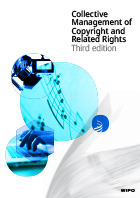Collective Management of Copyright and Related Rights
Collective management is one option within the copyright system that requires or allows rights holders to administer their rights through a Collective Management Organization (CMO).
Managing copyright and related rights individually may not always be realistic. An author, performer or producer, for instance, cannot contact every single radio station to negotiate licenses and remuneration for the use of their songs. On the other side, it is not practical for a radio station to seek specific permission from every author, performer and producer for the use of each song. CMOs facilitate rights clearance in the interest of both parties and economic reward for rights holders.
Basics

What is collective management?
By authorizing or mandating professional Collective Management Organizations (CMOs) to manage their rights, authors, performers, producers and other right holders can simplify the management of those rights.
Exclusive rights and collective bargaining can provide an alternative solution to collective management.

What are CMOs?
Collective Management Organizations (CMOs) are, in most cases, not-for-profit entities; their legal form can be either private or public. Depending on the repertoire they represent, they can also be called Music Licensing Companies (MLCs), Mechanical Rights Organizations (MROs), Performers’ Collective Management Organizations (PMOs) or Reproduction Rights Organizations (RROs).
Various types of collective management approaches exist, including statutory/mandatory collective management, as well as contractual/voluntary collective management.

What do CMOs do?
Typically, a CMO:
- monitors when, where and what works are used;
- negotiates tariffs and other conditions with users;
- licenses the use of protected works on behalf of its members and of other rights holders it represents; and
- collects the fees from users and distributes these to the rights holders.
(Images: Getty Images/lushik/AVIcons/nidwlw/ jojotgdc/da-vooda)
News
WIPO Partners with ISNI to Assign Standards Identifying Creators
November 27, 2024
Collective Management of Text and Image-Based Works
May 26, 2023
WIPO activities

Technical assistance
WIPO provides assistance in a range of formats upon demand from member states. This assistance generally draws on expert knowledge and can help policy makers and stakeholders get the most out of copyright and related rights in their specific national context.

Training (WIPO Academy)
The WIPO Academy offers several (online) distance learning courses in the area of collective management. Courses exist that are tailored to: legal practitioners (DL 501), right holders (DL 502), CMOs (DL 503), and policy makers (DL 506).

IT infrastructure
WIPO Connect is an interconnected system for the collective management of copyright and related rights. It enables CMOs to manage their operations locally and to connect to regional and international networks for works and right holder data exchanges.

Dispute resolution
When parties are involved in a collective management-related dispute, the WIPO Arbitration and Mediation Center can provide procedural assistance to help them solve the dispute out of court.
Resources
Full list of WIPO resources on collective management.

WIPO Good Practice Toolkit for CMOs
The Toolkit brings together examples of legislation, regulation and codes of conduct in the area of collective management from around the world.
Download
Collective Management of Copyright and Related Rights
This third edition of Collective Management of Copyright and Related Rights presents an in-depth revision with invaluable updates on the different systems, legislative options and best practices of CMOs worldwide.
DownloadRelated links
Outside links
- CISAC - International Confederation of Societies of Authors and Composers
- IFRRO - International Federation of Reproduction Rights Organisations
- IFPI - International Federation of the Phonographic Industry
- SCAPR - Societies’ Council for the Collective Management of Performers’ Rights
- AGICOA - Association for the International Collective Management of Audiovisual Works